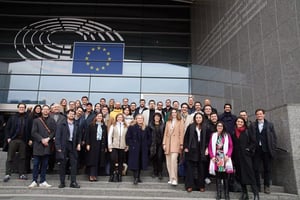
The AI Act
The AI Act is here. What you need to know now.
What is the AI Act?
The AI Act is a European Union law on artificial intelligence. It applies to any use of AI in the EU or where it affects people in the EU.This landmark initiative puts the European Union at the forefront of AI governance and innovation.
The overarching goal of the Act is to protect the health, safety and fundamental rights of individuals as AI products enter the market. The legislation takes a risk-based approach, categorizing the use of AI as 'unacceptable risk', 'high risk', 'general purpose AI', 'limited risk' and 'minimal risk'.
The AI Act creates a single framework for the creation, distribution, use and adoption of AI. It replaces existing national AI regulations, making it easier and legally safer for companies to operate across the EU. It went into effect on July 12, 2024, with transitional periods between 6 and 36 months.

“Retorio’s goal is to empower people. We regard AI as a great opportunity to democratize access to personal development and give everybody the chance to develop useful skills and behaviors in their job role. As a company that has always adhered to strict ethical principles, the AI Act doesn’t change anything for Retorio. The same is also true, of course, to customers using our platform.”
Dr. Christoph Hohenberger , Co-founder at Retorio
What is Retorio’s stance on the AI Act?
We at Retorio believe that innovation requires rules. To protect users and data, we need the coexistence of ethics, flexibility, and clarity.
Retorio aims to play a vital role in an innovative future of AI governance, privacy and data protection, providing trust and confidence to clients and stakeholders.
This is why Christoph Hohenberger, Co-CEO of Retorio GmbH, attended the AI and Data Acts conference in Brussels back in March of 2023 and participated in the conversation about the new AI and data regulations in Europe.
Yes, Retorio is 100% AI Act compliant. It uses neither biometric data to recognize individuals nor is it an “emotion recognition system”, as the law calls it. See here, especially the definition in point 18: eur-lex.europa.eu
Retorio has consistently adhered to existing regulations, including the AGG (General Equal Treatment Act), regardless of the technology employed and, of course, the AI Act.
It is Retorio’s goal to democratize access to knowledge and meaningful coaching in psychologically safe environments. We are all about enabling people, not about collecting data. To achieve this, we blend psychological research with our highly sophisticated artificial intelligence (AI) to create scalable solutions that empower growth and success.
We are and will remain committed to meeting all future regulatory requirements. From the outset, we have operated on the basis of three core principles. These principles underline our unwavering commitment to ethical practices and legal compliance.
As Retorio’s customer, you don’t need to worry.
Retorio’s platform fully complies with all existing EU regulations – including the new AI Act. With Retorio you are safe.
Principle |
Retorio’s approach |
|
Relevance of data captured |
We only capture and analyze data that has been empirically examined and is relevant. |
|
Model robustness |
Our models are tested against science-based test data and undergo internal performance and quality checks. |
|
Ethics |
Deployment and use of the technology follows the ethical guidelines for the development of trustworthy AI as proposed by the EU (Link). |
Retorio itself is officially ISO-certified, the company has passed numerous rigid tests in terms of employee training, processes and data protection.
Retorio’s platform is hosted in the EU, also on ISO-certified servers. To check their robustness, penetration tests are performed every quarter.
Disaster recovery plans are set in place to prevent loss of data. The platform can only be accessed by authorized users.
All data on Retorio's AI platform can be deleted from within the system. Person-related data is optional, the platform works completely without any personal data, for example by using full anonymisation (i.e. token login).
Retorio’s platform is fully transparent by informing each participant that an AI system is in use.
Discrimination is when one person is treated less favorably than another. It can be based on gender, color of skin, ethnicity, sexual orientation, age and disability, among other things.
One problem can lie in the data that algorithms are being trained on and which data points are being collected. Retorio addresses this point in two ways. First, Retorio’s AI is trained on demographically diverse data sets. These data sets are constantly being checked by using scientific tests.
Secondly, Retorio’s AI coaching does not capture any of the mentioned discriminations as a data point, nor is it relevant, possible, or intended for the platform.
The fact that Retorio does not know who the user is and that their characteristics are not recorded, means the coaching platform is more value-free than any human can be.
Retorio has set itself the task of democratizing access to useful knowledge and coaching in a job and career context. We want everyone to have access to the best job training available so that they can not only perform better, but also get more satisfaction from their work.
The fact that training is available individually, using only a PC, tablet or smartphone, reduces the need for expensive and environmentally problematic travel.
In order to give as many people as possible the best coaching, we naturally build and design software to be barrier-free
We adhere to §Section 4 BGG: “Buildings and other facilities, means of transport, technical commodities, information processing systems, acoustic and visual information sources, communication facilities, as well as other designed areas of life, are barrier-free if they can be found, accessed, and used by people with disabilities without particular difficulty, and in principle, without outside help.”
We carry out regular user and platform tests to ensure barrier-free use. This includes software ergonomics tests, such as measures to guarantee legibility for people with color impairments. We follow international development standards such as WCAG.
Retorio’s platform is organized by using clear roles to avoid any overlapping and conflicts of interest.
All employees receive mandatory GDPR training, and the data protection officer is an external specialist, not connected to anybody within the organization.
No. The platform does not conduct any biometric analysis and we are not interested in personal identification in the future.
According to the Federal Commissioner for Data Protection and Freedom of Information, the General Data Protection Regulation (GDPR) defines "biometric data" as personal data obtained using special technical procedures relating to the physical, physiological, or behavioral characteristics of a natural person that enable or confirm the unique identification of a natural person, see Art. 4 No. 14 GDPR. Examples include facial images or dactyloscopic data (fingerprints).
Retorio is not designed to identify an individual and does not record any physical, physiological or behavioral characteristics that can be used to identify an individual person. Retorio cannot and does not aim to recognize users from video or other data.
No. Retorio’s AI coach helps employees understand how their behavior affects their relationships with customers. The platform gives personalized feedback on the employee’s behavior based on how friendly or serious they respond to the simulated customers, and what they did well or can improve on in terms of communication.
However, the underlying AI does not recognize emotions, and does not try to do so. The AI only checks facial expressions, such as a smile.
The legal text explicitly distinguishes between "emotion recognition systems" and unproblematic behavior recognition, described like this: “This does also not include the mere detection of readily apparent expressions, gestures or movements … Those expressions can be basic facial expressions, such as a frown or a smile, or gestures such as the movement of hands, arms or head, or characteristics of a person’s voice, such as a raised voice or whispering.” eur-lex.europa.eu
Retorio allows employees to experience AI coaching in a psychologically safe environment. Retorio’s AI coach does not influence the mental state of users nor does it recognize any emotions, feelings, or psychological states.
We do not collect or try to build databases from external sources (e.g. images from the internet or CCTV footage).
No. Retorio only focuses on the observed behavior of a user (e.g. whether they are smiling at the simulated customer or look serious).
The underlying AI does not understand whether the user is actually happy or sad, and does not try to understand, because that would be irrelevant to the purpose of the coaching. As the system does not understand the employee's emotions, there is no attempt to influence or control them. The difference is explicitly acknowledged in the AI Act’s legal text.
No. We are not about “checking” on people, we are about enabling people. The platform is only used for training, to help people get better doing their jobs.
We can not currently and have no intentions to check people’s individual performance at work.
We are all about enabling people. Therefore, Retorio’s platform does not hide any data from the user – it is all transparent.
There is no automated decision making, the system is not self-learning or automatically updating.
What problems does Retorio actually solve?
Retorio is used in HR to support companies in the selection and development of employees. Research suggests that HR-decisions are strongly influenced by subconscious factors and biases. The great importance of gut feelings on the part of decision-makers often leads to unequal treatment, unnecessary workload, and bad hiring decisions.
Prevent unequal treatment in HR processes
Talents are still discriminated against on the basis of their skin color, religion, and culture. For instance, based on a field experiment, a 2018 study by WZB shows that black and white applicants are treated significantly differently, even when they apply with identical CVs.
Retorio ensures that only factors that are within the control of the applicant are included in the results. We actively debias our datasets and models to ensure Retorio does not see skin color, gender, or age.
Moreover, Retorio does not consider a person's dialect, the background of an application video, hair color, etc. For humans, avoiding these factors is substantially more difficult.
Reduce recruiter workload, improve interview quality
Overworked HR departments often have little time to prepare for and follow up on their interviews. In their accelerated workday, decision makers need to rely on their intuition which might be subject to biases.
Whereas in the past only a fraction of all applicants were able to introduce themselves in person, Retorio provides each individual with an opportunity to introduce himself or herself and to show exactly what a resume does not reveal: who he or she is.
Recruiters have access to all video applications and form their own judgment. They only meet with candidates who really stand a chance and have access to meaningful data to prepare for the interview.



